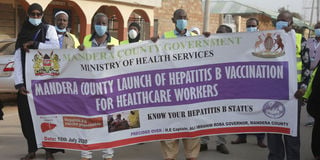Premium
Mandera starts campaign to eradicate Hepatitis B in the region

What you need to know:
- Globally, July is the World Hepatitis Month, with July 28 celebrated as the World Hepatitis Day.
- Dr Eda said Hepatitis B is the commonest sub-type in Mandera County.
- It is responsible for most infections and leads to chronic liver cirrhosis and liver failure.
The Mandera County government has launched efforts to kick out Hepatitis B from the region.
County Secretary Abdinur Maalim Hussein Thursday led health workers in a vaccination drive against the disease at the Mandera County Referral Hospital.
Mr Hussein was accompanied by Health Executive Mohamud Eda and Health Chief Officer Rahma Abdullahi.
The launch was preceded by a procession in Mandera town by the health workers to sensitise locals on Hepatitis B.
OCCUPATIONAL EXPOSURE
The county secretary said health workers are at a higher risk of contracting Hepatitis B due to occupational exposure through body fluids and blood from infected patients.
The launch of a free Hepatitis B vaccine for health workers, he said, was thus “a major public health cornerstone in our health services delivery”.
This mass vaccination campaign is to be expanded to cover all Mandera residents with the aim of kicking Hepatitis B out of the county.
“In line with the Big Four agenda of the president in which quality healthcare is the cornerstone, Mandera County under the leadership of Governor Ali Roba will keep scaling the heights to ensure our people attain the highest attainable level of health services,” Mr Hussein said.
ANOTHER BIG MILESTONE
On his part, Dr Eda said the launch “marks another big milestone in our great County of Mandera in health services delivery with the beginning of the first phase of a campaign meant to kick Hepatitis B out of Mandera County”.
Globally, July is the World Hepatitis Month, with July 28 celebrated as the World Hepatitis Day.
There are several sub-types of Hepatitis with A, B and C being the commonest, all posing a huge health problem.
CHRONIC LIVER CIRRHOSIS
Dr Eda said Hepatitis B, which is the commonest sub-type in Mandera County, is responsible for most infections and leads to chronic liver cirrhosis and liver failure as well as liver cancer as an end stage complication.
At the same time, Ms Abdullahi said the health workers are screened to ensure no one is vaccinated without knowing his or her status.
“Out of the 226 staff screened, 4.5 per cent tested positive,” she said.
Her department, she added, has noted a rise in Hepatitis B infections. She added that measures have been put in place to ensure health workers are fully protected as per the immunisation policy.
Globally, according to the World Health Organisation, an estimated 240 million people are chronically infected with Hepatitis B virus.
“A recent global burden of disease study estimates that most sub-Saharan African countries, including Kenya, have a prevalence of chronic Hepatitis B infection of 10 per cent which is about 400,000 persons annually,” Mr Hussein said.
INFECTION PREVALENCE
The infection prevalence, he said, is highest among people who live in north eastern region (13.9 per cent) followed by those who received blood transfusion (11.2 per cent).
“The study revealed that the reasons for high prevalence among residents of north eastern may be due to shared common cultural or traditional harmful cultural practices like FGM and polygamy, coupled with low level of vaccination against Hepatitis B in the adult population,” Mr Hussein said.
According to the Kenya Demographic and Health Survey, a total of 10,270 people were tested for Hepatitis B in Mandera County last year with 10 per cent of them turning positive.
Hepatitis B is transmitted through blood or body fluids of an infected person including sexual intercourse and sharing of infected needles by drug abusers.
VACCINE PREVENTABLE
“The good news is, this is a vaccine preventable illness, with vaccination conferring life-long immunity if a person receives all the required three doses at zero, one and six months and with booster doses after 10 years,” Dr Eda said.
Emphasising that prevention is always better than cure, Dr Eda urged locals to go for testing to know their Hepatitis B status and get vaccinated to protect themselves and their families.
On Covid-19, the Dr Eda said the pandemic requires concerted individual and government effort to stop community transmission and break the infection chain.
“We urge our people to take this killer disease seriously and take personal protection seriously in line with the guidelines by the Ministry of Health,” he said.





